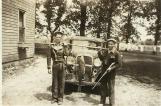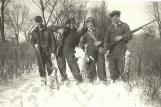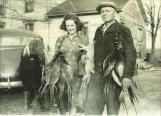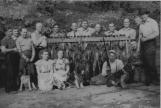4
Neighbours Frank Steingart and Jake Heinrichs displaying their catch1944
Pelee Island, Ontario
 Credits:
Credits:Essex Kent Mennonite Historical Association
5
Brothers Nick and George Wiens, second and third from left, hunting rabbits with their friendsCirca 1944
Pelee Island, Ontario
 Credits:
Credits:Essex Kent Mennonite Historical Association
6
Ken Dick remembers, "My dad did the cooking once we moved here [in 1948], and many times John [G. Wiebe, with whom we lived] would say, 'Well, what are we going to have for supper tonight?' and my dad'd say, 'Well, how about pheasant?' or how about rabbit or something like that, and John'd say, 'I'll be back in a minute.' He'd have shot the pheasant out of the tree, and already plucked it and so on, or skinned the rabbit."7
Jacob Epp and daughter Ruby Epp holding pheasants and one rabbit at their home on the East-West RoadCirca 1932
Pelee Island, Ontario
 Credits:
Credits:Essex Kent Mennonite Historical Association
8
Island farmers pressed the Pelee Town Council to request permission from the Department of Lands and Forests to hold a hunt. Their motive was the extensive damage being done to crops by pheasants. When biologist Benson visited Pelee, he concluded there were sixty thousand pheasants on Pelee Island. The birds, it was alleged, followed the rows of freshly seeded grain, feeding, and thereby reducing the farmers' yields. The request was granted and the first pheasant hunt was held in 1932.9
1943 Pheasant Hunt at the Ginter Home1943
Pelee Island, Ontario
 Credits:
Credits:Essex Kent Mennonite Historical Association
10
The hunt was always held in late October. Some hunters would arrive on Wednesday, hunt for two days, and leave on Friday afternoon or Saturday morning. Most came on the Pelee Boat and others came by airplane.11
The Annual Two-Day Pheasant HuntCirca 1932
Pelee Island, Ontario
 Credits:
Credits:Essex Kent Mennonite Historical Association
12
The hunt was advertised by the London Free Press, The Windsor Star, The Detroit Times, and various other newspapers. It became well-known all over Canada and the United States.The hunters came from all walks of life. Hunters boarded with Island families, or stayed in the hotel and private clubs. Some families had to hire help from other Islanders, or from the mainland, and these people were paid for their help.
13
Anne Fast remembers, "The hunters were served about six or seven meals during their stay. Supplies not available locally were brought in from the mainland. We had our own eggs, dairy products and meat, but buying bacon for breakfast was a real treat for us."14
There was no indoor plumbing so water was carried in from the wells. Without electricity, food was cooked on a wood stove.Bacon and eggs were served at breakfast. Meals consisted of homemade chicken noodle or vegetable soup. Roast chicken and beef dishes were served with homegrown vegetables. The bread and various desserts were all freshly baked.
15
It was a lot of work, but the whole family participated. The four schools were closed for two days. The men and older boys acted as guides for the hunters and earned some extra cash. It was an exciting time for all of us.16
Gerhard Wiebe describes working for an American hunter, Howard Snure, pictured in the next photograph, featuring pheasants hanging in a W-shape across the garage:My brother Fred and I acted as bird dogs for the hunters. The man with the glasses is Howard Snure, an American businessman from Detroit. His hunting dog was an Irish setter. Howard gave me $5.00 American for cleaning burrs off of his dog!
He visited us once in the summer on his yacht with his son Skip, who was about my age. They gave Dad and I potato chips out of a can, and we roamed around the yacht, looking at things.
Another hunter, Ralph Herring from Dayton, Ohio, sent us bags of pecans, and a real football with shoulder pads. He also sent several boxes of canning jars that Mom used for years. I think he sent these as a Christmas present.
17
Pheasants in a W-shape. Gerhard Wiebe talking to pheasant hunters with brother Fred sitting in front1947
Pelee Island, Ontario
 Credits:
Credits:Essex Kent Mennonite Historical Association